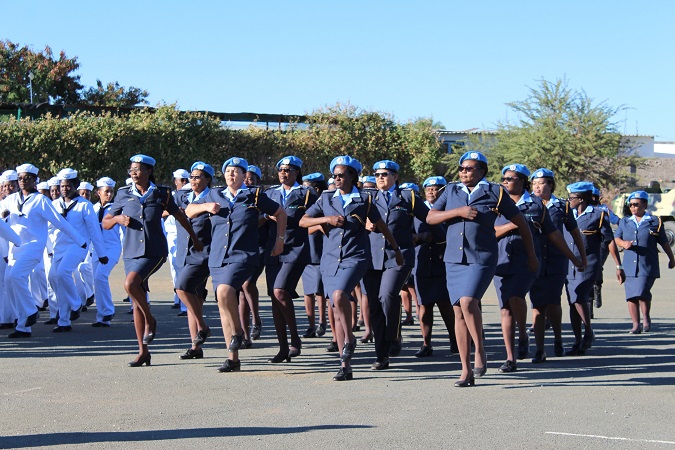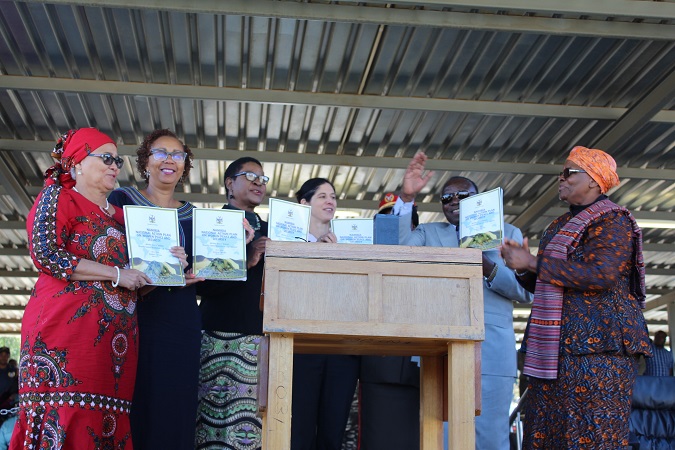Namibia Launches its first National Action Plan on Women, Peace and Security
Date:

On 19 June, the Namibian government launched the country’s first-generation National Action Plan (NAP) on Women, Peace and Security. The five-year plan will guide Namibia’s implementation of the United Nations Security Council Resolution (UNSCR) 1325 and subsequent resolutions on Women, Peace and Security. Based on the four pillars of participation, prevention, protection, and relief and recovery, the Women, Peace and Security Agenda is critical to advance the role of women in conflict prevention, negotiation and peace-building.
For member states, National Action Plans provide a clear structure to guide the implementation of women, peace and security commitments that countries are party to and affirms the country’s policy position on the importance of mainstreaming gender in its peace and security institutions, promoting gender equality and women's full participation in conflict prevention, resolution, and peace support operations. Further, it takes into consideration that though the nature of insecurity has changed, women still bear the brunt of conflict and insecurity.
National Action Plans also realise the changing nature of insecurity and violence – which may not play itself out as armed conflict or war. Issues such as harmful social norms and cultural practices, drug and alcohol abuse and gender-based violence all form part of the tapestry of current security challenges. Therefore, the response to insecurity and conflict needs to change by paying specific attention to the role that women play in reducing insecurity and promoting peace nationally and regionally whether formally in security institutions or informally as mediators and negotiators in communities.
Delivering the keynote address at the launch ceremony which featured a parade of women in security forces, Namibia Deputy Prime Minister and Minister of International Relations and Cooperation, Honourable Netumbo Nandi-Ndaitwah cautioned that the realisation of the African Union Agenda 2063 and the Sustainable Development goals could not happen in the absence of peace. She also emphasised that the involvement of women in delivering and sustaining peace was fundamental to developmental goals. “I strongly believe, that unless both men and women are participating in the contribution to bring about peace, that peace cannot be sustained. Africa will never achieve Agenda 2063 without peace. Women, Peace and Security must be at the centre of sustainable development.”
Describing the National Action Plan as a “a noble achievement worth celebrating,” Honourable Billy Mwaningange, Namibia Deputy Minister of Defence affirmed Namibia’s commitment to moving the United Nations Security Council Resolution 1325 forward. “We are aware of the huge responsibility of ensuring that the Namibia National Action Plan on Women, Peace and Security is implemented effectively, and the results meaningfully increase the participation of women in all peace efforts. Our focus therefore will be to promote and encourage the inclusion of women in all undertakings; and prepare them through training and mentorship programmes to be ready to participate in all peace and security endeavours.”

In supporting remarks, Rachel Odede, Resident Coordinator a.i. for the United Nations in Namibia, recalled Namibia’s leadership in the adoption of the historical UNSCR 1325 which exposed the gender specific impact of armed conflict and acknowledged women’s voices in international peace and security. She also commended Namibia for joining the growing number of UN member states who have institutionalised the Women, Peace and Security Agenda and for affirming the experiences and contribution of women in the peace and security sector. “The launching of this document and its implementation is of particular interest for Namibia – as the Security Council Resolution 1325 was adopted during Namibia’s presidency of the UNSC in 2000 and Namibia played a significant role in its adoption. The importance of the Security Council Resolution lies in its significant effect that it brings change in the perception of peace and security. It also puts focus on the actors and victims and forces their integration in the peacebuilding process. Integrating women in the peacebuilding process cannot be underestimated as we are all familiar with the impact of wars on women and children.”
Anne Githuku-Shongwe, UN Women South Africa Multi-Country Office Representative acknowledged progress being made in achieving gender equality but called for immediate acceleration to achieve the Sustainable Development Goals by 2030. “Despite great progress there are still great challenges that we must overcome - and overcome speedily. If we continue at this rate it will take over 700 years to achieve gender equality in the security sector - Namibia must figure out how to get the security sector to 50% women because it is possible. These are the challenges we want to solve and achieve through the National Action Plan.”
Following the official launch, Namibia joins over 80 UN member states with National Action Plans. Declaring the First Namibia National Action on Women, Peace and Security officially launched, Honourable Nandi-Ndaitwah emphasised the Namibian government’s commitment to its sustained implementation. “The effective implementation of, and accountability for the NAP requires a monitoring and evaluation plan, and a robust coordination mechanism. The Namibian Government, through the relevant line ministries will ensure that these instruments are in place and that regular reporting is undertaken and documented to realise the objectives of this plan.”